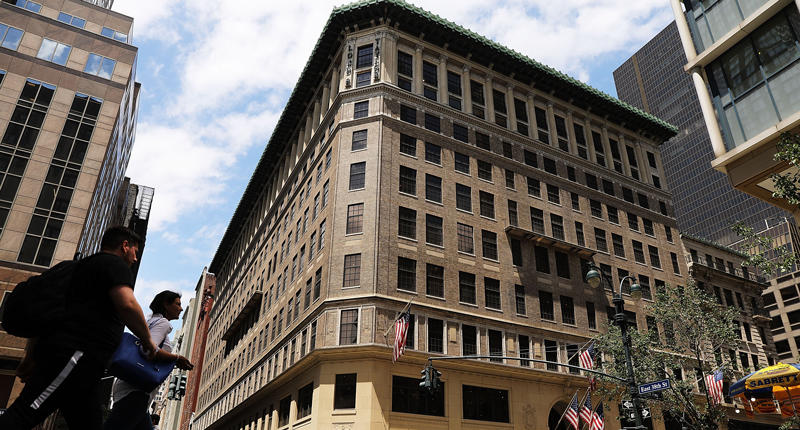As WeWork attempts to scrub its image clean of Adam Neumann, some of the ousted CEO’s transactions serve as a bitter reminder of the company’s former culture of excess.
One is WeWork’s $850 million purchase of the Lord & Taylor building. Six current and former WeWork employees familiar with the acquisition told The Real Deal that WeWork overpaid, perhaps by as much as $200 million. Moreover, some said, the deal was rife with potential conflicts of interest.
A particular concern was the role of Steve Langman, a WeWork board member who held interests in the buyer, the seller and the tenant in the Midtown building before the sale closed.
“I’ve never seen a more conflicted situation,” said one person close to the deal. A source close to Langman countered that the board member had recused himself from votes that would have entailed a conflict of interest.
The future of the iconic property, at 424 Fifth Avenue, is now being considered as WeWork looks to cut costs.
The company abandoned its planned public offering in the fall and its valuation has plummeted by $39 billion. SoftBank, its largest investor, has since agreed to extend a roughly $9 billion lifeline to save the company from potential bankruptcy and has installed a new chairman, former Sprint CEO Marcelo Claure.
New co-CEOs Artie Minson and Sebastian Gunningham have committed to focusing on WeWork’s core office-space business and offloading side ventures launched by Neumann, who left earlier this month.
Most of WeWork’s heavily scrutinized transactions have been unwound, including ones involving Neumann — notably his purchase of properties that he then leased back to WeWork. (Those have been sold to WeWork’s real estate investment group.) A $5.9 million payment he received for giving the company rights to the trademark “We” was returned after withering criticism. And a $60 million Gulfstream jet the company purchased has been put on the market.
Like the Lord & Taylor building’s lease, these transactions were approved by WeWork’s board members, most who remain in place.
Among them is Langman, whose $5.5 billion private equity firm, Rhône Group, is a major investor in WeWork’s real estate investment vehicle. He was an early investor in WeWork and is known to be close to Neumann, whom he met through links to the Kabbalah Center, a spiritual organization that promotes Jewish mysticism.
Langman was chosen along with Neumann’s wife, Rebekah Neumann, and board member Bruce Dunlevie to nominate a replacement for the CEO in the event that he was incapacitated or died.
“Langman became involved at an early point, before Adam had the world circling around him,” said one current WeWork employee. A former executive said, “Langman has some weird control over Adam.”

424 Fifth Avenue (Credit: Getty Images)
According to four current and former employees of WeWork, Langman’s tight relationship with Neumann clouded the Lord & Taylor building transaction. Some questioned how he was allowed to have interests in so many sides of the deal.
After Lord & Taylor abandoned plans to stay in the 10-story, 105-year-old building, WeWork was forced to take over the entire property to satisfy lenders for the purchase. It then had to negotiate a lease with its real estate investment vehicle, WeWork Property Advisors, which was buying the property.
Langman sat on both WeWork’s board and the investment advisory committee of WeWork Property Advisors. In addition, after the deal went into contract, he and another WeWork Property Advisors executive, Eric Gross, joined the board of Hudson’s Bay Company, the seller of the building.
“It was an above-market purchase price, and we had to sign an above-market lease to save Langman’s ass and save the deal,” said one former WeWork executive. A current employee familiar with the matter said Neumann drummed up support for the acquisition. “The rationale internally was, this was a crown jewel.”
Read more



A person close to Langman said he has recused himself from all WeWork board votes relating to the company’s real estate investment vehicle, including the Lord & Taylor building lease.
A spokesperson for Canada-based Hudson’s Bay said in a statement that Langman and Gross recused themselves from all board decisions regarding the Lord & Taylor building before the sale was complete “to avoid any conflicts of interest.”
In a statement, a WeWork spokesperson said “its decision to lease space in 424 Fifth Avenue was reviewed and approved in accordance with the procedures of the board.”
A spokesperson for Neumann declined to comment.
The “Adam and Steven Show”
In March 2017, WeWork went beyond its primary business — leasing office space — and began looking at buying properties. It launched WeWork Property Advisors, a joint venture with Langman’s Rhône Group.
The venture is now part of an investment vehicle called ARK, which has purchased properties across the U.S., including a 4.7-acre development site in Austin, Texas. Although it acts as a siloed entity to WeWork, they share advisers. One current employee described it as the “Adam and Steven show,” before Neumann left the company.
Its first target was the Lord & Taylor building, which since its completion in 1914 had been the flagship store for the storied company. But with ecommerce undermining traditional retailers, its parent company, HBC, found itself desperate for cash.
It was an above-market purchase price, and we had to sign an above-market lease to save Langman’s ass and save the deal.
A 2016 appraisal commissioned by HBC valued the landmark building at $655 million. The following year the company had advanced discussions with prospective buyers, including Brookfield, which dangled a $700 million offer, according to the Wall Street Journal. But a person close to HBC said no formal offers were made until WeWork Property Advisors put in a bid.
An agreement was reached in October 2017. The $850 million deal called for WeWork Property Advisors to acquire the building and its managing partner, Gross, to take a seat on HBC’s board. WeWork also committed to taking space in some HBC locations.
Separately, Langman’s Rhône Group would take a $500 million stake in HBC — almost a third of the company — earning him a board seat. In December, WeWork Property Advisors put down a $75 million deposit on the building.
A HBC spokesperson said the building acquisition and Rhône’s investment in HBC were “negotiated at arm’s length” with HBC management. The deal was approved unanimously by HBC’s board before Langman and Gross became members, the spokesperson said.
“They overpaid by $150 million to $200 million,” said one person close to the matter. A current WeWork executive said, “We clearly overpaid, and it was no secret.”
The initial plan involved Lord & Taylor staying in the building through 2018. After that, the retailer would occupy a 150,000-square-foot retail space, and WeWork would move its headquarters there and take office space for its clients, HBC said in a press release at the time.
But plans to fill the retail portion of the building with Lord & Taylor fell through. As a result, prospective lenders began demanding that WeWork lease the entire building to secure debt, according to three people with knowledge of the situation. The lenders were also wary of the high purchase price of the property.
In addition, more than $200 million was needed for a gut renovation of the building. In November 2018 Manhattan Community Board 5 recommended rejection of the new designs, which were led by Bjarke Ingels Group and included a two-story glass cube on the roof. The Landmarks Preservation Committee ultimately approved the project.
Pressure to close the deal increased as WeWork’s investment arm missed two deadlines and paid $50 million to keep the seller from walking.
Meanwhile, tensions grew between WeWork’s real estate division and WeWork Property Advisors over the cost of the rent. They ultimately agreed to a $105-per-square-foot lease — a figure boosted by the higher-priced retail space. Office asking rents for that neighborhood were $75 a square foot in first quarter of 2019, according to CBRE.
As WeWork’s board signed off on the lease, JPMorgan and Starwood committed to provide a $900 million loan to WeWork Property Advisors for the purchase and renovation of the building.
A landmark’s murky future
WeWork Property Advisors closed on the sale of the Lord & Taylor building in February, more than a year after agreeing to buy it. The building is now a construction site, with WeWork overseeing extensive renovations.
But the company’s options for the building appear to be dwindling. Efforts to attract other tenants have failed. In July, Amazon briefly discussed taking over the building. And with massive job cuts looming at WeWork, the prospect of its employees filling the Lord & Taylor building is unlikely.
Last week, Crain’s reported that the company hired a leasing broker and is considering marketing the building to enterprise clients. Rumors that WeWork is mulling a sale are circulating in New York’s real estate industry, but unloading it could involve a significant markdown of the building, some prominent city brokers said.
In a statement, WeWork said it “remains committed to 424 Fifth Avenue,” and that it is “excited” to reopen the building next year once it completes renovations.
Regardless of its future, the building has served as a stepping stone for Langman and his firm Rhône Group. With its Hudson’s Bay stake, Rhône joined HBC’s chairman in taking the company private this month, at a valuation of about $1.3 billion.
